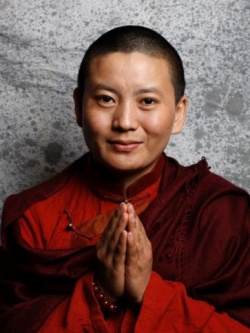What is the awareness in Buddhism and other nondual traditions?
It seems to me now much more clearly that the very nature of Enlightenment in Buddhism (or maybe better to say in a wide range of sophisticated philosophical traditions,even Western as I see) is closely connected in its core to better and better understanding (with time this became greater-various turns of the Wheel or new meta-levels higher)of Nonduality or in other words in deeper and deeper(with each new breakthrough) Nondual Awareness that looks like the most important aim of all.
And we live in times when it have begun to transcend the specifications and limitation of different religions(or science) becoming something more important than they are and divisions they create.
We always can go further in nondual awareness of everything.But now the question.
What is awareness itself because it appears to me that we can penetrate the duality of awareness/non-awareness into level where this again becomes false dichotomy or is it from the beginning nondual and serves for reaching nondual understanding of other things,being able to search and reach different depths and levels of such understanding?
"In his commentary to Candrakirti’s Madhyamakåvatåra, Mi pham argues that Tsong khapa is wrong to take Candrakirti’s rejection of the reflexive character of consciousness to be a rejection of the conventional existence of reflexive awareness.
Instead, he argues, Candrakirti only intends to reject the reflexivity of awareness ultimately, and, indeed, Mipham argues, it is simply obvious that conventionally, consciousness is reflexive."
For me as a reflexive theorist the reflexivity of awareness is a crucial question, and I agree with Mipham that anyone can verify that awareness is reflexive by introspection, so what would lead a great thinker like Dzong Ka Pa to abandon his own intuitions for a statement of a prior theorist that is manifestly untrue.
And I think that is because the tradition has become more important than the evidence of ones own experience, which is always a bad sign.
This made me trust Mipham's interpretation of DzogChen more.
Normally Phenomenology talks about Consciousness which Husserl understands as wholly intentional.
It is Gurewitsch who introduces awareness into phenomenology and recognizes it as important.
Awareness is non-intentional in some sense.
But the question is whether reflexivity is in consciousness or awareness. I place it in both as something deeper than either consciousness or awareness as such and that can be seen to be based on the ideas of Demasio that you have to have a sense of self to have any experience what so ever.
I really like Demasio's treatment of this issue in The Feeling of What Happens: Body and Emotion in the Making of Consciousness, Harcourt, 1999 He also has a new book called Self Comes to Mind: Constructing the Conscious Brain, Pantheon, 2010 which I have not read yet.
But he takes into account all the latest neurological information in his formulation of the problem of reflexivity, i.e. the fact that the self is there with every experience.
